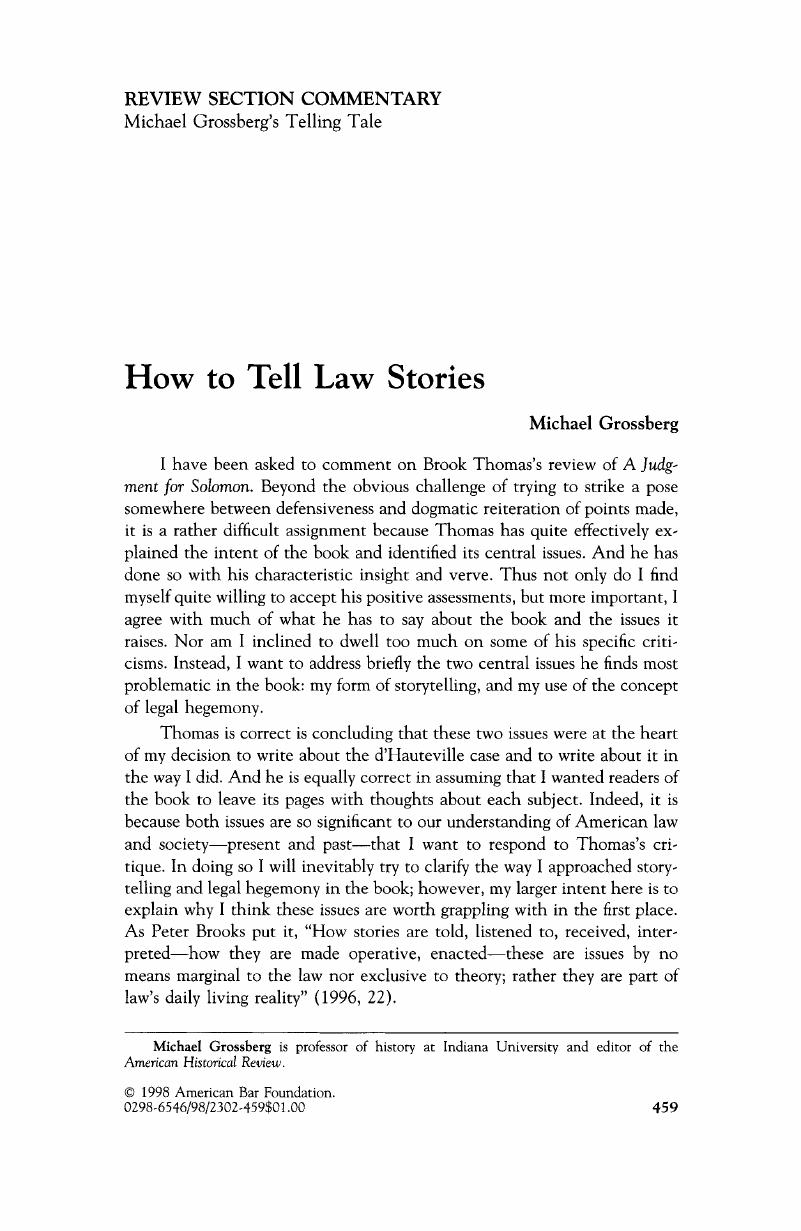No CrossRef data available.
Article contents
How to Tell Law Stories
Published online by Cambridge University Press: 27 December 2018
Abstract
An abstract is not available for this content so a preview has been provided. Please use the Get access link above for information on how to access this content.

- Type
- Review Essay
- Information
- Copyright
- Copyright © American Bar Foundation, 1998
References
Brooks, Peter, and Paul Gewirtz, eds. 1996. Law Stories, Narrative and Rhetoric in the Law. New Haven, Conn.: Yale University Press.Google Scholar
Cohen, Paul. 1997. History in Three Keys, The Boxers as Event, Experience, and Myth. New York: Columbia University Press.Google Scholar
Davis, Natalie Z.
1973. The Return of Martin Guerre. Cambridge: Harvard University Press.Google Scholar
Demos, John. 1994. The Unredeemed Captive: A Family Story from Early America. New York: Random House.Google Scholar
French, Rebecca. 1996. Review Essay: Of Narrative in Law and Anthroplogy. Law & Society Review
30:417–35.Google Scholar
Genovese, Eugene D.
1974. Roll Jordan, Roll, The World that the Slaves Made. New York: Pantheon Books.Google Scholar
Ginzburg, Carlo. 1980. The Cheese and the Worms: The Cosmos of a Sixteenth-Century Miller, trans John, and Tedeschi, Anne. Baltimore: Johns Hopkins University Press.Google Scholar
Gewirtz, Paul. 1996. Narrative and Rhetoric in the Law. In Brooks and Gewirtz 1996. Goodman, James. 1994. Stories of Scottsboro. New York: Pantheon Books.Google Scholar
Grossberg, Michael. 1996. A Judgment for Solomon: The D'Hauteville Case and Legal Experience in Antebellum America. New York: Cambridge University Press.Google Scholar
Lears, T. Jackson. 1985. The Concept of Cultural Hegemony: Problems and Possibilities. American Historical Review
90:567–93.Google Scholar
Llewellyn, Karl, and Hoebel, E. Adamson. 1941. The Cheyenne Way. Norman: University of Oklahoma Press.Google Scholar
Mallon, Florencia E.
1994. Reflections on the Ruins: Everyday Forms of State Formation in Nineteenth-Century Mexico. In Everyday Forms of State Formation: Revolution and the Negotiation of Modem Rule in Modern Mexico, ed. Gilbert M. Joseph and Daniel Nugent. Durham, N.C.: Duke University Press.Google Scholar
Maza, Sarah. 1996. Stories in History: Cultural Narratives in Recent Works in European History. American Historical Review
101:1493–1515.Google Scholar
Megill, Alan. 1989. Recounting the Past: “Description,” Explanation, and Narrative in Historiography. American Historical Review
94:627–53.Google Scholar
Mnookin, Robert, and Kornhauser, Lewis. 1979. Bargaining in the Shadow of the Law: The Case of Divorce. Yale Law Journal
88:950–1013.Google Scholar
Pocock, J. G. A.
1975. The Machiavellian Moment: Florentine Political Thought and the Atlantic Republican Tradition. Princeton, N.J.: Princeton University Press.Google Scholar
Roseberry, William. 1994
Hegemony and the Language of Contention. In Everyday Forms of State Formation: Revolution and the Negotiation of Modern Rule in Modern Mexico, ed. Gilbert M. Joseph and Daniel Nugent. Durham, N.C.: Duke University Press.Google Scholar
Sewell, William. 1992. Introduction to Special Issue: Narratives and Social Identities. Social Science History
16:479–88.Google Scholar
Skinner, Gjuentin. 1978. The Foundations of Modern Political Thought. New York: Cambridge University Press.Google Scholar
Thomas, Brook. 1998. Michael Grossberg's Telling Tales: The Social Drama of an Ante bellum Custody Case. Law and Social Inquiry
23:431–58.Google Scholar
Tomlins, Christopher. 1993. Law, Labor, and Ideology in the Early Republic. New York: Cambridge University Press.Google Scholar
Weisberg, Robert. 1996. Proclaiming Trials as Narratives: Premises and Pretenses. In Brooks and Gewirtz
1996.Google Scholar
Williams, Patricia. 1991. The Alchemy of Race and Rights. Cambridge: Harvard University Press.Google Scholar




